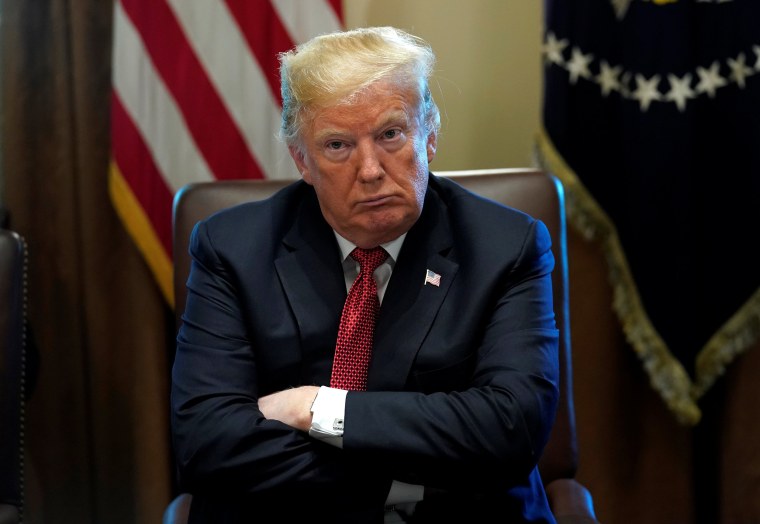Much has been said recently about the concept of innocent until proven guilty. During Judge Brett Kavanaugh’s confirmation hearings earlier this month, we heard every variation of the argument that Dr. Christine Blasey Ford’s testimony was not enough to overcome Kavanaugh’s presumption of innocence. President Donald Trump has now taken this rhetoric to the next level, seeming to publicly apply the presumption of innocence standard both to Kavanaugh and to the disappearance of U.S. permanent resident and Washington Post reporter Jamal Khashoggi. Mounting evidence suggests that Saudi Arabian agents loyal to Crown Prince Mohammed bin Salman tortured, murdered and then dismembered Khashoggi. But when asked whether the U.S.-Saudi relationship should be re-evaluated in light of the new allegations, Trump told the AP: “I think we have to find out what happened first. You know, here we go again with, you know, you’re guilty until proven innocent. I don’t like that.”
In both instances, the president misapprehends (either actually or for purposes of political expediency) the nature and origin of the concept of presumption of innocence. There is no omnipresent presumption of innocence that attaches to every aspect of our lives or every circumstance in which someone has done wrong.
The president misapprehends (either actually or for purposes of political expediency) the nature and origin of the concept of presumption of innocence.
In 1895, the Supreme Court established the applicability of the presumption of innocence for defendants in criminal trials in the case of Coffin v. United States. Ever since, this has been a bedrock principle of our criminal justice system designed to give defendants a fair trial. But even in our criminal justice system, this standard applies only at trial, once a jury has been empaneled to decide a case. This may come as a surprise to many, but with the exception of the trial itself, our court system actually presumes that a person charged with a crime committed the crime with which he is charged.
Here’s how it works: To arrest someone, police must have evidence showing “probable cause” that the individual committed a criminal offense. However, there is no presumption of innocence involved when a police officer asks a judge for an arrest warrant. Neither the officer nor the judge is applying a presumption of innocence during this process.
Once someone is arrested, the criminal justice system operates on the belief that the person who has been charged with a crime actually committed that crime. This is precisely why prosecutors pursue pre-trial detention and why judges routinely order defendants jailed pending indictment and trial. To be sure, prosecutors must satisfy evidentiary showings along the way (probable cause, preponderance of the evidence, clear and convincing evidence, etc.) to keep a defendant jailed pending trial. But in a very real sense, the system presumes the defendant has committed the crime with which he is charged.
With the exception of the trial itself, our court system actually presumes that a person charged with a crime committed the crime with which he is charged.
It's only when a jury is empaneled to decide the case that the judge instructs jurors that they are to presume the defendant is innocent unless and until the evidence proves his guilt beyond a reasonable doubt. This presumption of innocence forces jurors to start from square one and decide if they are persuaded by the evidence introduced at trial as opposed to media reports, outside opinions or other factors.
In other words, the presumption of innocence is a useful fiction designed to give every defendant a fair trial, not some universal principle that guides our everyday lives. It does not, and arguably should not, permeate our culture and existence. Consider the following hypothetical: If an assault victim is standing in the street bleeding from a stab wound and the attacker is running away with a bloody knife in his hand, we don't freeze the scene and say, "well, we have to presume the knife-wielding maniac innocent."
In the reality, we are constantly having to decide who's right and who's wrong, who's telling the truth and who's lying, who is trustworthy and who is untrustworthy. To make these choices, we look at all available evidence and information and reach informed conclusions.
By way of another analogy, “propensity” evidence — the inclination of a person to commit crimes — is not admissible in court. This means that a prosecutor trying to convict a defendant accused of bank robbery cannot introduce evidence of the defendant’s three prior bank robberies to try to persuade the jury that he committed a fourth. But while propensity evidence may not be admissible in a courtroom, it sure is relevant outside of it. Indeed, most people want to know as much information and context as possible when making real-time decisions.
Turning back to Trump’s broad application of the presumption of innocence: It has been widely reported that a Saudi Arabian hit squad was dispatched to Turkey to kill Jamal Khashoggi due to his criticism of the Saudi government. The evidence supporting that theory quickly has mounted. According to the Washington Post and the Wall Street Journal, the attack on Khashoggi may have been captured on audio or video recordings. Nevertheless, Trump complains that people are deciding that the Saudi government is “guilty until proven innocent.”
This substantial evidence, coupled with reports of the crown prince's previous attempts to silence critics, makes it an eminently logical and supportable conclusion that Khashoggi was murdered at the behest of government officials. Of course, if any member of the Saudi government is ever brought to justice in an American courtroom, he will then enjoy a presumption of innocence.


